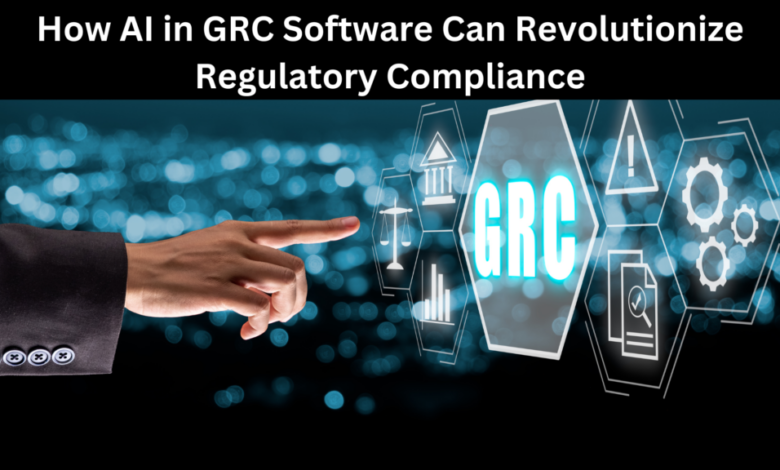
As the business landscape grows more complex and globalized, companies are under increased pressure to stay ahead of the curve in regulatory compliance. This is where artificial intelligence (AI) in governance, risk, and compliance (GRC) software enters the picture. By 2028, information security and risk management spending is forecast to exceed 310 billion U.S. dollars.
Leveraging AI, businesses can transform their compliance operations, making them more proactive, efficient, and adaptable to evolving regulations. In this blog post, we will explore how AI-driven GRC solutions are revolutionizing regulatory compliance.
Transforming Compliance Processes with AI
AI in GRC software is transforming how businesses handle regulatory compliance. Traditionally, compliance management has involved extensive manual work, such as collecting data, generating reports, and reviewing regulatory changes. AI-powered solutions integrated with grc compliance software are automating these repetitive tasks, freeing up time for compliance professionals to focus on strategic decision-making.
Automating Routine Tasks
AI-driven GRC solutions streamline compliance activities such as data collection, reporting, and monitoring. For example, AI can automate the extraction of data from various sources, ensuring that all necessary information is collected and analyzed promptly. By automating these tasks, businesses can:
- Reduce human error: AI minimizes the risk of mistakes that often occur when manually handling large amounts of data.
- Save time: With automation in place, employees can focus on more complex tasks, driving better strategic outcomes.
- Improve compliance speed: AI processes data more quickly, enabling faster regulatory reporting and quicker response times to new regulations.
Enhancing Accuracy and Efficiency
AI-powered risk assessment tools enhance the accuracy of compliance assessments by leveraging vast amounts of historical data to detect patterns and predict potential issues. This enables businesses to identify non-compliance risks much earlier, providing them with a proactive edge.
Some key benefits of AI in compliance management include:
- More precise risk assessments: AI tools analyze large datasets to uncover hidden risks, making the compliance process more accurate and reliable.
- Faster response times: AI systems can instantly detect compliance violations, allowing for faster corrective action and reducing the chances of penalties.
- Optimized resource allocation: By automating routine tasks, AI frees up resources, allowing compliance teams to focus on higher-level strategic work.
Proactive Risk Management
One of the major advantages of incorporating AI into GRC software is its ability to help businesses manage risks proactively. Traditional risk management often relies on past incidents and historical data to predict future risks. However, AI goes beyond this by providing real-time insights and predictive analytics.
Predictive Analytics
AI for regulatory compliance utilizes predictive analytics to assess historical data and forecast potential risks. This allows organizations to anticipate compliance issues before they occur, enabling early intervention.
By using AI-powered risk management software, businesses can predict emerging risks by analyzing patterns in historical data to foresee potential compliance challenges. It also mitigates risk by proactively addressing issues before they materialize, preventing costly penalties or reputational damage.
Continuous Monitoring
AI-powered GRC software provides continuous monitoring of compliance activities. This real-time surveillance ensures that businesses remain in compliance at all times, even as regulations evolve.
Continuous monitoring can help organizations identify non-compliance early and adapt to regulatory changes. Maintain oversight across all departments with AI, ensuring compliance across the entire organization, from financial reporting to data protection, eliminating gaps in oversight.
Enhancing Vendor Oversight
In today’s interconnected business environment, third-party vendors play a crucial role in regulatory compliance. With AI in GRC software, organizations gain more comprehensive oversight of their vendors and their compliance statuses.
Comprehensive Vendor Analysis
AI evaluates third-party vendors’ compliance status, financial health, and associated risks, providing businesses with a holistic view of their supply chains. By incorporating AI into governance risk and compliance, organizations can:
- Assess vendor risk profiles: AI tools analyze a vendor’s compliance history, financial stability, and risk exposure, giving businesses valuable insights.
- Identify potential risks in the supply chain: AI highlights vulnerabilities in the supply chain, ensuring that businesses can take proactive steps to mitigate risks.
Supply Chain Security
AI has a vital function in further strengthening the security of a given supply chain. It helps businesses compare their vendor performance and compliance continuously in identifying possible threats before they develop into full-blown catastrophes. This is especially crucial in industries where such non-compliance can create major communication disruptions.
Addressing Challenges in AI Adoption
While AI offers substantial benefits, organizations must be mindful of the challenges that come with its adoption, particularly in regulated industries. Below, we explore some key hurdles that businesses must address to ensure successful AI implementation in compliance management.
Data Privacy and Security
The most popular issue regarding the introduction of artificial intelligence in GRC software systems is the security of sensitive information. AI systems typically require large amounts of data for effective functioning, which can, in some instances, include extremely sensitive issues. Companies must implement sound cybersecurity measures to protect such data from unauthorized access.
Regulatory Uncertainty
The regulatory landscape continues to evolve, and AI in the governance, risk, and compliance of software must continue to manage this change. AI technology is recognized as a challenge by the law; hence, corporations are now required to start knowing the new emerging AI laws to ensure compliance.
The Future Outlook of AI in Regulatory Compliance
AI with the capability to conform to changing regulatory requirements, AI can serve as a smooth weapon for future-proofing compliance operations. As businesses face increasing complexity in their compliance requirements, they will continue to seek the adherence capability provided by AI moving forward.
AI is a moving tool and changes accordingly with the altered regulations. By analyzing patterns of emerging regulations and compliance trends, AI in Compliance Software would help the business anticipate upcoming requirements. More could be expected in the forthcoming years concerning AI in GRC software, which will get into deeper integrations with other technologies
Traditional vs AI-Driven Compliance Solutions
| Feature | Traditional Compliance Solutions | AI-Driven Compliance Solutions |
| Automation | Minimal automation, manual processes | High automation, streamlined tasks |
| Risk Prediction | Reactive, based on past data | Predictive analytics, proactive approach |
| Data Processing | Time-consuming, prone to errors | Fast, accurate data processing |
| Continuous Monitoring | Limited, periodic checks | Real-time continuous monitoring |
| Vendor Oversight | Manual vendor assessments | Automated, AI-powered vendor risk assessments |
Conclusion
AI in GRC software is the next frontier, paving the way for businesses in the more complex world of regulatory compliance. Routine task-filling, risk management improvement, and enriching vendor supervision with the disruptive feature of AI technology, can take businesses’ compliance out of retrograde and into the future.
The sky is the limit to what those GRC solutions can accomplish in helping you optimize performance and effectiveness in your compliance processes, reduce what risk you have, and build your comprehensive compliance strategy.
FAQs
How does AI improve the efficiency of compliance procedures?
The GRC solutions powered by AI automate all those complex and repetitive tasks, which range from compliance audits to risk assessments. This greatly boosts efficiency in compliance procedures.
What are the potential risks associated with implementing AI in compliance processes?
Major risks associated with implementing AI in compliance processes include data privacy issues, algorithmic biases, and high costs of training and implementation.
How can organizations ensure the ethical use of AI in compliance?
Organizations can promote ethical AI use through specific measures such as installing solid and hard cybersecurity measures and keeping abreast of newly developing AI regulations, among other dimensions in addressing challenges like algorithmic bias themselves.


